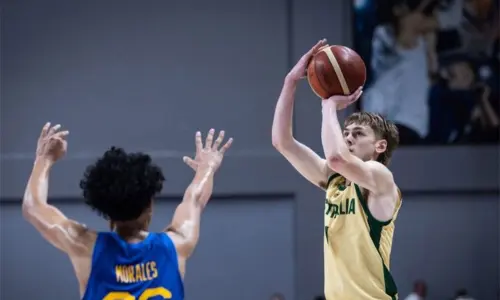
Australia beats Gilas in FIBA U17 World Cup.
MANILA, Philippines – The Gilas Pilipinas boys concluded what proved to be a challenging FIBA U17 World Cup journey on a disheartening note, ultimately being ranked as the weakest team among the 16 competing nations. The culmination of their campaign was marked by a particularly tough defeat against Australia, with the scoreboard reflecting a stark 115–53 in favor of their opponents, as the clock struck Sunday afternoon in Manila (local time) at the Ahmet Comert Sports Hall in Türkiye.
Leading up to their encounter with the Australian team, the Philippine squad had faced a series of formidable adversaries, resulting in a continued string of losses. Their previous matchups had seen them contend valiantly yet ultimately fall short against Lithuania, Spain, Puerto Rico, the United States, Argentina, and China. The momentum of these prior defeats seemed to persist in their game against Australia, where the opposing team’s dominance was evident throughout the entirety of the match.
Despite their unwavering effort and determination, the challenges faced by the Gilas Pilipinas team proved to be insurmountable in this prestigious global competition, underscoring the fierce competition and high levels of play exhibited by their international counterparts. Throughout the tournament, the team consistently pushed themselves to the limit, battling with resilience and unwavering spirit against foes who exemplified top-tier basketball prowess. The sheer intensity of the competition served as a true test of their skills and endurance, highlighting the competitive nature of the sport on a global stage.
Furthermore, the experience acquired through competing against such formidable and globally renowned opponents is undoubtedly going to play a crucial role in enhancing the knowledge and skills of the emerging young athletes. By actively engaging with and pitting their skills against world-class talent from various corners of the globe, the members of the Gilas Pilipinas team have not only broadened their perspectives but have also honed their capabilities to excel under pressure.
This exposure to top-tier competition is poised to act as a catalyst for their personal and professional growth, equipping them with a profound understanding of the game and the strategic insights necessary to navigate the intricacies of professional basketball. The lessons gleaned from these high-stakes encounters will undoubtedly serve as a launchpad for their future endeavors in the fiercely competitive arena of professional sports, laying a solid foundation for their continued development and success. Ultimately, the invaluable experiences gained from this challenging and enriching journey will undoubtedly propel them towards achieving their full potential and establishing themselves as formidable forces to be reckoned with in the world of basketball.

Australia beats Gilas in FIBA U17 World Cup.
Shifting the focus to individual performances within the tournament, Dash Daniels emerged as a standout player for Australia, showcasing his exceptional skills on the court. With an impressive stat line of 28 points, 4 rebounds, 4 assists, and 6 steals in the recent basketball match, Daniels displayed his versatility and impact on both ends of the floor. Additionally, Nash Walker’s contributions were instrumental to the team’s success, as he added 18 points to the scoreboard and played a key role in maintaining an outstanding field goal percentage of 59.3%. Together, their stellar performances underscored the talent and determination that defined the competition, setting a high standard for excellence in the world of basketball.
The game began with a glimmer of hope for Gilas as Edryn Morales drove to the basket and executed a flawless layup, providing the Philippines with an early 2-0 advantage that sparked a sense of optimism among the Filipino fans in attendance. However, this fleeting moment of triumph quickly faded as the formidable World No. 4 team from Australia showcased their dominance on the court. By the end of the first quarter, Australia had surged ahead to a commanding 31-13 lead, with Kurt Velasquez sealing their dominance by draining a crucial three-pointer just before the buzzer sounded, widening the gap to 31-16 as both teams prepared for the challenges of the upcoming second quarter.
As the game progressed, it became increasingly apparent that Australia’s superior skill and athleticism were proving to be insurmountable obstacles for the Philippines, with the gap in score further widening as the relentless Australian team continued to intensify their offensive and defensive efforts. Despite the valiant efforts of Gilas to regroup and mount a comeback, the sheer consistency and precision of Australia’s plays and strategies kept them firmly in control, leaving the Filipino team struggling to bridge the ever-growing divide on the scoreboard. Ultimately, the opening quarter served as a stark reminder of the competitive disparity between the two teams, setting the stage for a challenging and uphill battle that Gilas would have to confront as the game unfolded.
Throughout the intense and riveting basketball game, Dash Daniels unquestionably established himself as an influential presence on the court, demonstrating an impressive combination of skills and expertise that not only emphasized his ability to rack up points but also underlined his versatility in contributing significantly across various facets of the game. His stellar performance not only showcased his knack for scoring – effortlessly sinking shots from different areas of the court – but also highlighted his well-rounded capabilities by actively engaging in crucial defensive maneuvers, orchestrating plays with expertly executed passes, and playing a pivotal role in securing possessions through impactful rebounding efforts.
It was truly Dash’s brilliance and consistency that acted as the catalyst for propelling Australia into a position of dominance during the match, with his exceptional gameplay inspiring and motivating his teammates to elevate their performance levels. Furthermore, Nash Walker emerged as a key figure in maintaining the team’s momentum with his consistent scoring contributions, which further solidified Australia’s lead on the scoreboard. The synergy between Dash’s commanding presence and Nash’s reliable scoring proficiency created a formidable duo that the opposing team found challenging to contain.
Moreover, the team’s collective accuracy in converting field goal opportunities into points served as a testament to their unwavering focus and determination throughout the game, illustrating their high level of precision and skill in executing offensive strategies. Australia’s strong offensive performance, spearheaded by Dash’s dynamic presence and bolstered by Nash’s clutch scoring moments and the team’s overall shooting proficiency, ultimately cemented their commanding lead and secured a well-deserved victory.

Australia beats Gilas in FIBA U17 World Cup.
Despite Edryn Morales’ early effort to ignite a spark for Gilas, it became evident that Australia’s collective strength and skill were insurmountable, swiftly establishing their supremacy on the basketball court, which left the Philippines in a perennial state of trailing behind. Throughout the first quarter, Australia’s strategic execution and offensive firepower were on full display, showcasing a level of dominance that set the tone for the rest of the game. This exemplary performance not only highlighted Australia’s prowess but also underscored the challenges faced by the Philippines in keeping up with such a formidable opponent.
The meticulous planning and precision with which Australia executed their plays allowed them to gain a significant advantage early on, giving them a solid foundation from which to build their lead as the game progressed. As the match unfolded, it became increasingly apparent that Australia’s comprehensive game plan and superior basketball IQ were proving to be decisive factors, posing a formidable obstacle for Gilas to overcome. The relentless pressure exerted by Australia’s players coupled with their seamless teamwork created a formidable force that the Philippines struggled to contend with, forcing them to constantly play catch-up throughout the game. In essence, Australia’s dominance in the first quarter not only highlighted their technical proficiency but also exposed the gaps in Gilas’ defensive strategy, making it a challenging uphill battle for the Philippines to bridge the growing gap in performance between the two teams.
Australia’s dominance in the game reached unprecedented heights during the match against the Filipino team, a display of their unwavering determination and relentless intensity. This relentless energy suffused their every move, keeping the pressure steadily on the opponents from the very beginning until the final buzzer sounded. Their ability to control the pace and flow of the game was truly remarkable, showcasing not only their exceptional skills but also their superior strategic thinking. It was as if they held the game’s strings, orchestrating each play with precision and foresight that left spectators in awe.
Their complete dominance over the court solidified their reputation as an eminent force in the tournament, one that demanded respect and attention from all competitors. The performance was not merely a showcase of individual talent but a testament to their seamless teamwork and unity of spirit. The players moved in perfect synchrony, a harmonious dance that spoke volumes about their dedication and trust in each other. This harmonious blend of skills and synergy elevated their game to a level where they seemed almost unstoppable, a team truly deserving of the admiration and accolades that their victory brought. In every aspect, from their technical prowess to their emotional resilience, they exemplified the qualities of a championship team that inspired not just fans, but perhaps even their opponents, to strive for excellence in every match.
As the game progressed, Australia’s lead widened significantly, creating an astonishing 62-point margin that left spectators in awe of their prowess. With the score standing at 109-47 and only 3:36 left on the clock, it became evident that the Australian team was on a mission to showcase their dominance in a formidable manner. Their ability to maintain such a remarkable lead spoke volumes about their consistency and resolve, setting them apart as a standout team in the competition.
One of the standout aspects of Australia’s performance was their outstanding accuracy from long range, particularly evident in their impressive tally of 16 successful three-pointers. This remarkable feat not only added to their lead but also served as a testament to the individual skills of players like Joel Robinson and Alexander Rickeson, who emerged as pivotal scorers with 11 points each. Their precise shooting and ability to capitalize on opportunities further solidified Australia’s position as a team that excelled in both offense and defense, making them a formidable opponent for any team in the tournament.
Despite the formidable challenge posed by the Australian team’s remarkable skill, the Philippines struggled to keep pace, their efforts spearheaded by the impressive performance of Edryn Morales, who notably contributed 17 points and secured 9 rebounds. Additionally, Wacky Ludovice played a pivotal role by adding 10 crucial points to the team’s tally, even though his otherwise commendable performance was somewhat shadowed by seven turnovers. This pattern of tough competition persisted throughout the tournament, resulting in an average losing margin of 51.3 points per game for the Philippines.
Even though the Gilas Pilipinas squad did not clinch a win in the demanding FIBA U17 World Cup, the experience garnered from competing against top-tier teams proved invaluable in shaping their future endeavors. It is in the crucible of elite competition that young athletes can truly elevate their game, absorbing key lessons and insights that will ultimately fortify their skills on the international stage. The challenges confronted during the course of the tournament stand as essential building blocks for the ongoing growth of the team, providing a solid foundation for them to progress and enhance their capabilities as they aim for excellence in global competitions.


